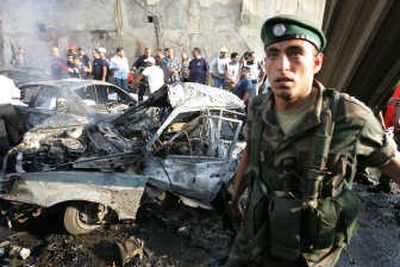Anti-Syrian lawmaker killed

BEIRUT, Lebanon – A Lebanese lawmaker who had long been critical of the Syrian regime was killed Wednesday along with his son and eight people when a bomb exploded near a popular waterfront promenade in Beirut.
The assassination threatened to further destabilize this small country already paralyzed politically, stretched militarily and suffering economically.
Walid Eido, a 65-year-old lawmaker with the anti-Syria coalition, was driving with his son Khaled and two bodyguards in a predominately Sunni part of town when the bomb tore through nearby cafes and ice cream parlors just before 6 p.m.
Security officials said Eido’s convoy was targeted with explosives that had either been placed by the roadside or rigged to another car.
Eido, a former high court judge, often appeared on television to rail against Syrian interference in Lebanon. He was a fixture on the waterfront, often playing cards with friends at the popular Sporting Club.
Eido’s assassination is the latest in a string of attacks against anti-Syrian notables in Lebanon but the first of a Sunni politician in Lebanon since the killing of former Prime Minister Rafik Hariri in 2005.
Hariri was a vocal critic of Syrian dominance of Lebanon, an issue that has contributed to sectarian divisions in the country. His death triggered widespread protests that eventually forced Damascus to end its 15-year military presence here.
The latest attack comes on the heels of a May 30 decision by the U.N. Security Council to establish an international tribunal to prosecute suspects in the Hariri assassination – a move opposed by Syria as well as by Shiite and Christian groups in the Lebanese opposition.
“The fact, timing and context of Eido’s death may all be significant, and surely spell more dark days ahead for Lebanon and the wider Middle East,” wrote analyst Rami Khouri in a piece distributed by Agence Global. “The reality is that nobody knows who is behind this killing and other attacks in Lebanon, though all seem increasingly connected in a spiral of political violence that now defines much of the region.”